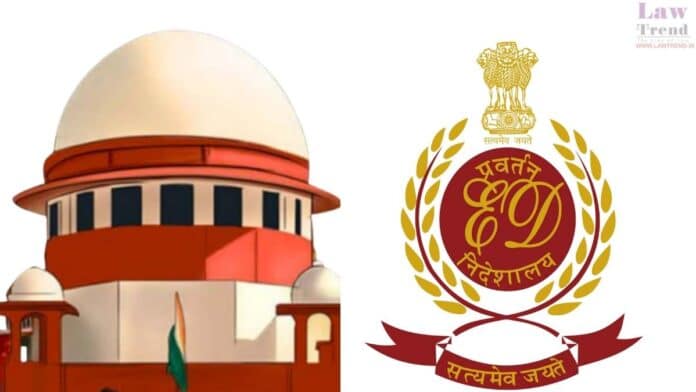The Supreme Court on Monday questioned the Centre’s application for a recall of its September 8, 2021 direction on the tenure of the director of the Enforcement Directorate (ED), saying “subsequent changes in law cannot be a ground for recalling or modifying an earlier court order”.
A bench of justices BR Gavai and Vikram Nath was told by Solicitor General Tushar Mehta, who appeared in the court on behalf of the Centre, that they have already moved an application for modifications in the order.
“I am not on merits. I only wish to submit that so far as the reliance placed by the petitioner on this court’s September 8, 2021 order, we have already moved an application for appropriate modifications in the said order. This court has issued a notice in that application,” Mehta said and urged the bench to tag its application with a batch of petitions challenging the extension of the tenure of ED Director Sanjay Kumar Mishra.

“We have already indicated that we would not entertain such an application since it is almost in the nature of a review,” the bench told Mehta.
The solicitor general said there have been subsequent legislative changes and therefore, the application was filed.
The bench said, “Subsequent changes in law cannot be a ground for recalling or modifying an earlier judgment or order of this court.”
At the outset, Mehta said the petition filed by Congress leader Jaya Thakur, questioning the Centre’s decision to give a third extension to Mishra and the amendments made to the Central Vigilance Commission (CVC) Act that allows extending the ED director’s tenure by up to five years, was based on a top court order passed on September 8, 2021.
Mehta said he needs some time to file a reply to the plea.
The bench then said the petition will be heard along with the Centre’s application and listed the matter after three weeks.
On September 8, 2021, the apex court had upheld the Centre’s power to extend Mishra’s tenure, but clarified that an extension should be given to officers after the age of superannuation only in rare and exceptional cases.
It had said a reasonable period of extension can be granted to facilitate the completion of ongoing investigations, only after reasons are recorded by the committee constituted under section 25(a) of the CVC Act.
The top court had also made it clear that no further extension can be given to Mishra.
It had said an extension of the ED director’s tenure should be for a short period.
The top court had noted that though there is no provision in the CVC Act for extension or reappointment of the ED director, section 21 of the General Clauses Act, 1897 enables the government to extend the tenure.
The apex court had said Mishra’s initial appointment cannot be termed illegal and he had a right to continue till November 18, 2020 by virtue of his appointment for a two-year period.
“For all practical purposes, he should be treated as the director of enforcement till that particular date he was holding an office, which is not below the rank of an additional secretary to the Government of India. Therefore, he was eligible for an extension of tenure,” the bench said.
Referring to section 25(f) of the CVC Act, the top court had said the tenure of the ED director would be for a minimum period of two years and a person can be appointed for a longer term.
It had also noted that there was no allegation that the power of extension of tenure was exercised for any unauthorised purpose.
The judgment had come on a plea filed by NGO Common Cause, challenging a retrospective change in the 2018 order appointing Mishra as the ED director.
It had resulted in extending Mishra’s tenure from two to three years. Mishra, an Indian Revenue Service (IRS) officer, was appointed as the ED director for two years by an order dated November 19, 2018.
Subsequently, by an order dated November 13, 2020, the appointment letter was modified by the Centre and Mishra’s two-year term was extended by another year.







